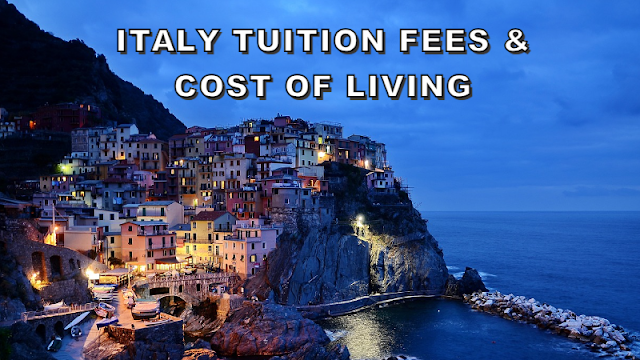Embarking on a higher education journey in Italy is an exciting prospect, but understanding the nuances of tuition fees and the cost of living is crucial for a smooth experience. In this comprehensive guide, we delve into the specifics of Italy Tuition Fees & Cost of Living Master, PhD, cost of living, and provide practical tips for saving money. Let's navigate through the diverse regions and uncover essential insights to make your study adventure memorable and budget-friendly.
Italy Tuition Fees & Cost of Living
Master's Program Tuition Costs
Tuition fees for Master's programs at public universities in Italy range from around €900 to €4,000 per year. Tuition fees for PhD programs are typically lower than for Master's programs, ranging from around €0 to €2,000 per year.
Tuition fees for Master's degrees in Italy:
- Public universities: €900 to €4,000 per year
- Private universities: €6,000 to €20,000 per year
Factors that affect tuition fees:
- Type of university
- Degree program
- Student's nationality
Scholarships:
- Available to students pursuing Master's degrees in Italy
- Offered by the Italian government, universities, and private organizations
PhD Program Tuition Costs:
For those pursuing a PhD., Italy offers competitive programs with reasonable tuition fees. Doctoral candidates often find scholarships or research positions that help alleviate financial burdens, making Italy an attractive destination for advanced studies.
Tuition Fees for PhD Degrees in Italy:
- Public universities: €0 to €2,000 per year
- Private universities: €3,000 to €10,000 per year
Factors that affect tuition fees
- Type of university
- Degree program
- Student's nationality
Scholarships:
- Available to students pursuing PhD degrees in Italy
- Offered by the Italian government, universities, and private organizations
Cost of living:
The cost of living in Italy varies depending on the city or town in which you live. However, in general, the cost of living in Italy is lower than in other Western European countries.
The average monthly cost of living for a student in Italy is around €900 to €1,300. This includes the cost of accommodation, food, transportation, and other expenses.
Here is a breakdown of some of the typical monthly expenses for students in Italy:
- Accommodation: €300-€700
- Food: €200-€300
- Transportation: €50-€100
- Other expenses (books, entertainment, etc.): €200-€300
Regional Variations in Tuition Fees:
Italy's diverse regions come with distinct characteristics, including variations in tuition fees. Understanding these differences helps you make informed decisions based on your budget and preferences.
- Northern Italy
- Renowned for its economic prowess, Northern Italy hosts prestigious universities. While tuition fees might be higher, the region's vibrant job market provides opportunities for part-time work.
- Central Italy
- The heart of Italy offers a balance between affordability and cultural richness. Universities in central Italy are known for quality education without exorbitant costs.
- Southern Italy
- With a lower cost of living, Southern Italy is an attractive option for budget-conscious students. Explore ancient history and enjoy a relaxed lifestyle while pursuing your academic goals.
- Islands of Italy
- Island life comes with unique experiences. Though tuition fees can vary, the cost of living on Italian islands can be higher. Plan accordingly for a tranquil but potentially more expensive study adventure.
Scholarships and Financial Aid:
Investigate available scholarships and financial aid opportunities to ease the financial burden. Many institutions and external organizations offer support to international students based on academic merit and financial need.
Part-Time Work Opportunities:
Supplement your income by exploring part-time work options. Italy provides opportunities for students to work part-time during their studies, contributing to both financial stability and cultural integration.
Tips For Saving Money:
Here are some tips for saving money on living expenses,
- Cook your own meals instead of eating out.
- Take advantage of public transportation.
- Buy a used bike or scooter to get around.
- Live in a shared apartment or student dormitory.
- Look for student discounts on goods and services.
- Take advantage of free activities, such as visiting museums and parks.
Advantages of Studying in Italy:
Discover the myriad benefits of studying in Italy, from academic excellence to cultural immersion. Gain a global perspective and build lifelong connections in this captivating Mediterranean country.
FAQs,
Q: Are scholarships available for international students in Italy?
A: Yes, numerous scholarships are available based on academic merit, nationality, and financial need. Research and apply for relevant opportunities.
Q: Can I work part-time while studying in Italy?
A: Yes, international students can work part-time to supplement their income. Ensure compliance with visa regulations and explore opportunities within your field of study.
Q: How do regional variations impact the overall cost of living?
A: Regional differences affect housing, transportation, and lifestyle costs. Consider your budget and preferences when choosing a study destination in Italy.
Q: Is health insurance mandatory for international students in Italy?
A: Yes, health insurance is mandatory. Explore affordable options provided by universities or external providers to ensure comprehensive coverage.
Q: What are the advantages of studying in Southern Italy?
A: Southern Italy offers a lower cost of living, a relaxed lifestyle, and unique cultural experiences. It's a compelling choice for budget-conscious students.
Q: How can I balance a limited budget with enjoying cultural events?
A: Look for free or discounted cultural events, explore local festivals, and take advantage of student discounts to enjoy Italy's vibrant cultural scene on a budget.
Conclusion:
Embarking on your academic journey in Italy is not just about mastering your field but also about embracing a new way of life. With careful planning, understanding regional variations, and leveraging available resources, you can make your experience enriching without breaking the bank.



0 Comments